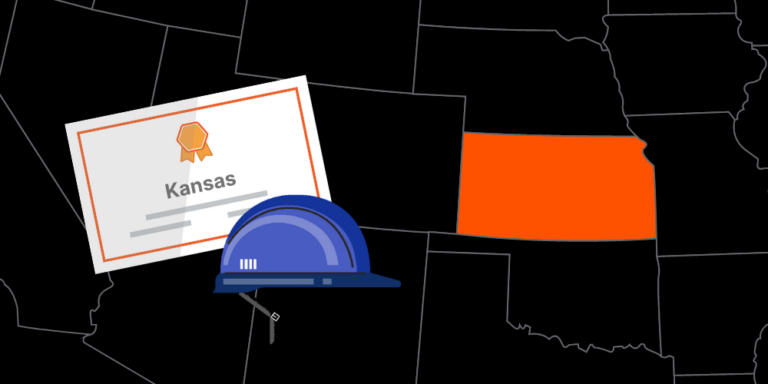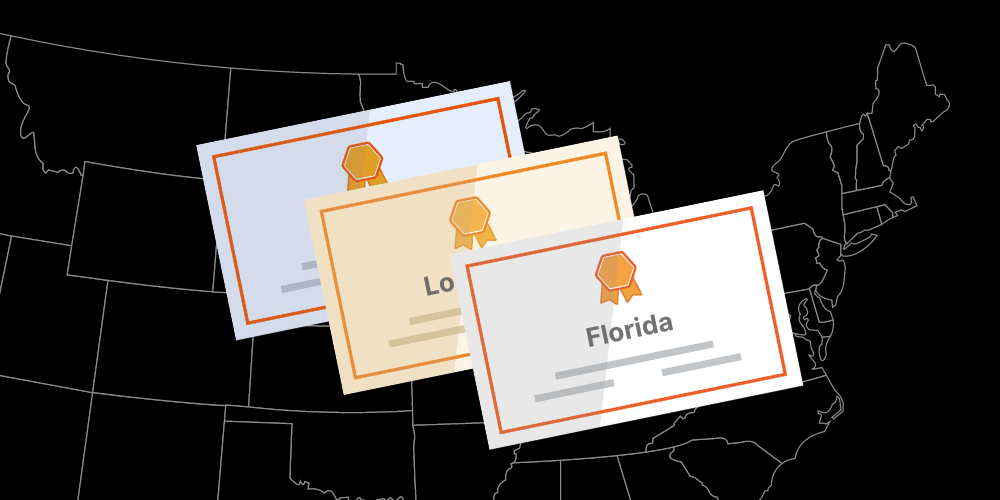— 4 min read
Kansas Contractor Licensing Guide

Last Updated Jan 30, 2025

Tom Scalisi
Contributing Writer
59 articles
Tom Scalisi is a writer with over 15 years of experience in the trades. He is passionate about educating contractors and specialty contractors about the best practices in the industry. He has seen first-hand how education, communication, and preparation help construction professionals overcome challenges to build a strong career and thriving business in the industry.
Last Updated Jan 30, 2025

Kansas does not have any statewide requirements for contractor licensing. However, most counties and local jurisdictions in Kansas have their own rules for contractor licensing. Fortunately, if you're getting your construction business started in Kansas, we have the information you need to get the required license to stay above board.
If you're interested to understand the Kansas contractor licensing process, read on for the details.
Table of contents
How to get a contractor license in Kansas
All corporations, limited liability companies, limited partnerships, limited liability partnerships, and general partnerships need to register their business with the State of Kansas Secretary of State. Information about registering is fairly sparse, so it’s best to contact the office directly.
Beyond business licensing, there isn’t one set path to Kansas contractor licensing. The steps required change from county to county, and with 105 of them, the regulations are bound to vary. Contractors who work in multiple counties will have to meet the requirements of each to ensure they’re working above board.
The best way to ensure you’re on the up-and-up in the areas you work in is to call the county or city clerk. They’ll be able to point you in the right direction regarding the appropriate licenses required to operate in their jurisdiction.
How to get a contractor license in Johnson County, Kansas
Contractor licensing in Johnson County, Kansas, is a function of the Johnson County Planning and Codes Department. The department offers several types of licenses, including:
- Class A - General
- Class B - Building
- Class C - Residential
- Class DE - Electrical
- Class DF - Fire
- Class DM - Mechanical
- Class DP - Plumbing
- Class DR - Roofing
- Class DS - Swimming
- Class DW - Framing
In general, the requirements for each of these licenses include:
- Complete the application
- Submit the $100 application fee and $225 license fee
- Submit proof of general liability and worker’s compensation insurance
- Establish a qualifying individual who must have either:
- Provide proof of identity of company owner and qualified individual with a government ID
- Provide a digital photo of the qualified individual
- Provide evidence of good standing from the Secretary of State
Like many local jurisdictions in Kansas, you’ll have to contact the department and request an application.
How to get a contractor license in Sedgwick County
Contractor licensing in Sedgwick County falls under the control of the Metropolitan Area Building and Construction Department, which works in conjunction with the City of Wichita.
The MABCD offers licenses for general contractors, as well as specialty contractors such as plumbers, electricians, elevator/escalator, fire suppression, refrigeration, and sheet metal, among others.
The requirements for licensing are relatively standard across the different license types:
- Complete the application, front and back, along with the signatures of everyone involved
- Provide proof of a master-level trade certificate
- Take, pass, and submit results of an ICC trade exam
- Provide proof of liability insurance with at least $300,000 in general liability showing MABCD as the certificate holder
- Provide proof of worker’s compensation insurance
- Proof of auto insurance on fleet vehicles
- A certificate of good standing from the Secretary of State
- Qualified Person (master license holder, or business owner if qualified) Declaration Page
- Signatures of all company officers
- Authorization for Qualified Person to do business for the company, including pulling permits and scheduling inspections. This proof must be written on company letterhead and signed by all owners, officers, and partners.
- Pay fees
Fees range dramatically depending on the license type. A Class A GC applicant will need to submit a fee of $1,000, while basic trades will pay $360.
How to get a contractor license in other Kansas jurisdictions
There are licensing requirements in other Kansas jurisdictions, but the best source of information is the county or city clerk in the area in which you plan to work. Most counties and cities require that contractors at least register their businesses before operating.
Penalties for unlicensed contracting in Kansas
All of Kansas' contractor licensing requirements come from the cities and counties throughout the state, as do the penalties for unlicensed contracting.
The penalties can vary from city to city or county to county, but expect fines and fees. Also, many building department officers will shut projects down, which may cause irreparable damage to a project timeline.
Was this article helpful?
Thank you for your submission.
91%
9%
You voted that this article was . Was this a mistake? If so, change your vote
Scroll less, learn more about construction.
Subscribe to The Blueprint, Procore’s construction newsletter, to get content from industry experts delivered straight to your inbox.
By clicking this button, you agree to our Privacy Notice and Terms of Service.
Thank you!
You’re signed up to receive The Blueprint newsletter from Procore. You can unsubscribe at any time.
Categories:
Written by

Tom Scalisi
Contributing Writer
59 articles
Tom Scalisi is a writer with over 15 years of experience in the trades. He is passionate about educating contractors and specialty contractors about the best practices in the industry. He has seen first-hand how education, communication, and preparation help construction professionals overcome challenges to build a strong career and thriving business in the industry.
View profileExplore more helpful resources

Contractor License Bonds: Everything You Need to Know
In order to perform construction work, many states require contractors to be “licensed and bonded.” What does that mean? Well, every state sets its own rules for contractor licensing, and...

Contractor’s Guide to License Reciprocity: Working Across State Lines
For many contractors, growing a construction business means taking on jobs in different states. Whether it’s to take a one-off project or to establish a new business location, working in...

Vermont Contractor License: Guide to Rules & Requirements
If you’re starting a construction business in Vermont or looking to expand your business from another state, being properly licensed to work is one of the first key steps. There...

The Maine Contractor License: Guide to Rules & Requirements
If you’re considering starting a contracting business in Maine, it’s important to know the rules and requirements for proper licensing. Maine takes a different approach to contractor licensing than most...
Free Tools
Calculators
Use our calculators to estimate the cost of construction materials for your next project.
Templates
Find a template to help you with your construction project tasks.
Material Price Tracker
Get the latest U.S. retail prices and view historical trends for common building materials.
Glossary
Explore key terms and phrases used in the industry.
